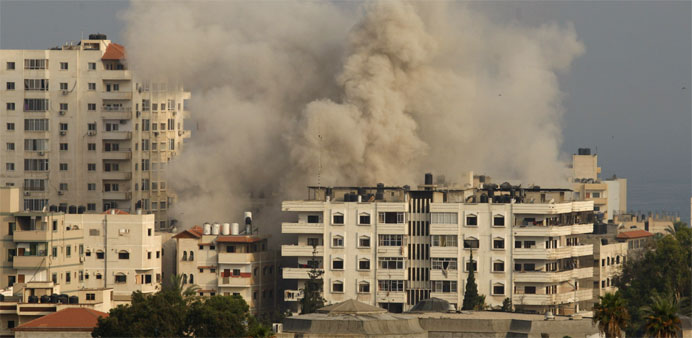Reuters/Gaza/Jerusalem
Israel pounded targets across the Gaza Strip on Tuesday, saying no ceasefire was near as top U.S. and U.N. diplomats pursued talks on halting fighting that has claimed more than 600 lives.
U.S. Secretary of State John Kerry held discussions in neighbouring Egypt, while U.N. Secretary General Ban Ki-moon flew to Israel to see Prime Minister Benjamin Netanyahu and meet on Wednesday with the Palestinian prime minister in the occupied West Bank.
However, there was no let-up in the fighting around Gaza, with plumes of black smoke spiralling into the sky, and Israeli shells raining down on the coastal Palestinian enclave.
Hamas, the dominant group in the Gaza Strip, and its allies fired more rockets into Israel, triggering sirens in Tel Aviv. One hit a town on the fringes of Ben-Gurion International Airport, lightly injuring two people, officials said.
Israel launched its offensive on July 8 to halt missile salvoes out of Gaza by Hamas, which was angered by a crackdown on its supporters in the occupied West Bank and suffering economic hardship because of an Israeli-Egyptian blockade.
"A ceasefire is not near," said Justice Minister Tzipi Livni, viewed as the most dovish member of Israeli Prime Minister Benjamin Netanyahu's inner security cabinet.
"I see no light at the end of the tunnel," she told Israel's Army Radio.
Dispatched by U.S. President Barack Obama to the Middle East to seek a ceasefire, Kerry held talks on Tuesday in Cairo with Egyptian Foreign Minister Sameh Shukri.
"There is a framework ... to end the violence and that framework is the Egyptian initiative," Kerry said at a joint news conference with Shukri.
"For the sake of thousands of innocent families whose lives have been shaken and destroyed by this conflict, on all sides, we hope we can get there as soon as possible," he said.
Egypt was key to securing an end to a previous bout of Gaza fighting in 2012, but the country's new leadership is openly hostile to Hamas, potentially complicating the negotiations.
"We hope (Kerry's) visit will result in a ceasefire that provides the necessary security for the Palestinian people and that we can commence to address the medium and long-term issues related to Gaza," Shukri said.
With the conflict entering its third week, the Palestinian death toll rose to 603, including nearly 100 children and many other civilians, Gaza health officials said.
The Israeli military said it had killed 183 militants.
Israel's casualties also mounted, with the military announcing the deaths of two more soldiers, bringing the number of army fatalities to 27 - almost three times as many as were killed in the last ground invasion of Gaza, in a 2008-2009 war.
HUMANITARIAN AID
Kerry said the United States would provide $47 million in humanitarian aid for Gaza. Washington is "deeply concerned about the consequences of Israel's appropriate and legitimate effort to defend itself," Kerry said. "No country can stand by when rockets are attacking it."
"But always, in any kind of conflict, there is a concern about civilians - about children, women, communities that are caught in it," Kerry said.
Kerry plans to stay in Cairo until Wednesday morning but has no set departure date from the region. Officials said he might travel to Qatar, a Gulf state which has relatively close ties to Hamas and hosts its leader, Khaled Meshaal.
The Health Ministry in Gaza said four people were killed and 70 were wounded on Monday at Al-Aqsa hospital, when an Israeli tank shell slammed into its third floor, which housed operating theatres and an intensive care unit.
The International Committee of the Red Cross issued a statement condemning the shelling "in the strongest terms". It said the hospital came under direct fire at least four times and that life-saving equipment had been severely damaged.

